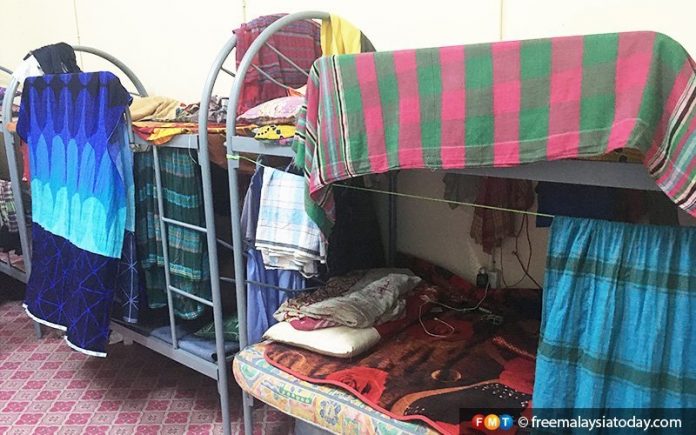
PETALING JAYA: The Malaysian Medical Association (MMA) has slammed the government’s inaction in enforcing new housing standards for workers.
The rise in Covid-19 cases linked to construction sites and factories has shone a spotlight on the cramped conditions that foreign workers live in, with FMT previously reporting how it was not uncommon to find some workers living in containers.
Senior Minister for Security Ismail Sabri Yaakob yesterday said the human resources ministry will start enforcing amendments to the Workers’ Minimum Standards of Housing and Amenities Act 1990 (Act 446) today, but MMA president Dr Subramaniam Muniandy said efforts to improve foreign workers’ housing should have been a priority “right from the beginning”.
“As usual, this is a reactive response, not proactive. This is typical (of) and is the fault of the government,” he told FMT.
“You cannot put clusters of people in one small room. Employers don’t want to spend money, so they put these workers in one room.
“We already know that being in close proximity helps spread diseases, which is why we maintain 2m (physical distancing).”
Amendments to the Act came into force on June 1, mandating a minimum space requirement for workers’ accommodation, basic facilities and safety and hygiene standards.
Employers were given a grace period until Aug 31 to comply, with the human resources ministry previously stating it would start enforcement on Sept 1.
DAP strategist Liew Chin Tong said given that worker’s dormitories have been identified as one of the sources of outbreak and infection, this is one of the priority areas the government must look into.
He said organisations employing foreign workers must ensure that housing provided for them meets health standards and specifications, with rooms and lodgings provided to factor in the space, design, facilities, and disease response considerations.
“Without these improvements, these vulnerable community living areas will continue to be recurring hotspots for virus infection and lead to further massive Covid-19 outbreaks,” he said in a statement.
“We are only as strong as our weakest link. We must do more to protect the most vulnerable in our society, which includes foreign workers.
“We need to seriously relook at how we are treating them and rethink their current working and living arrangements.”
Pointing out that the Teratai cluster in Meru, Klang, linked to foreign workers from the world’s largest medical glove manufacturer Top Glove, is now the biggest active Covid-19 cluster in Malaysia, Liew said this should serve as as a “cautionary tale” for industry players and Malaysians in general.
Seventeen new cases were reported in the Teratai cluster yesterday, which currently has 4,063 cases. The Damanlela construction site cluster, which is also linked to foreign workers, recorded 12 new cases yesterday and currently has 1,221 cases.
Human Resources Minister M Saravanan was reported as saying yesterday that checks on Top Glove factories in Meru revealed “terrible” conditions at the workers’ quarters, and that the “entire Labour Department” would be deployed to conduct further checks.
The company’s executive director, Lim Cheong Guan, later said he was surprised by the statement as the minister had said the hostels were in good condition during his recent visit. He said the company was seeking clarification from the ministry.
Ismail yesterday confirmed that 27 of the company’s 28 factories in Meru have now temporarily been closed by the government to allow factory workers to undergo screening and mandatory quarantine.
Malaysian Trades Union Congress deputy president Mohd Effendy Abdul Ghani told FMT last week that based on MTUC’s observation, most foreign workers were not aware of their basic rights and the avenues they could use to lodge complaints about poor housing conditions.
“They tend to treat it as their fate and just live with it,” he said. “This allows employers to get away with their negligence.”



